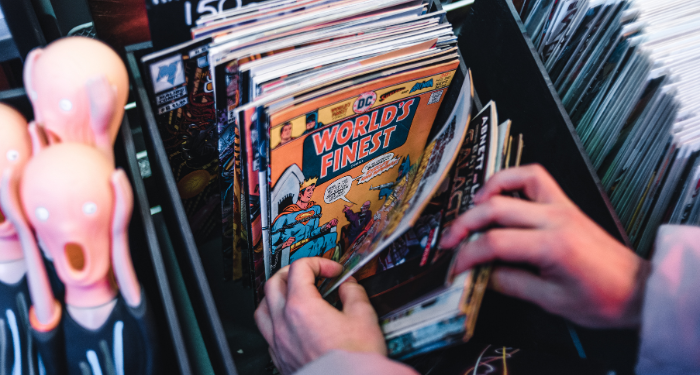
Jessica Plummer has lived her whole life in New York City, but she prefers to think of it as Metropolis. Her day job is in books, her side hustle is in books, and she writes books on the side (including a short story in Sword Stone Table from Vintage). She loves running, knitting, and thinking about superheroes, and knows an unnecessary amount of things about Donald Duck. Follow her on Twitter at @jess_plummer.
View All posts by Jessica Plummer
In June of 2020, the comics industry underwent a seismic shift that many readers probably didn’t notice at all: DC Comics announced that it wo…

Jessica Plummer has lived her whole life in New York City, but she prefers to think of it as Metropolis. Her day job is in books, her side hustle is in books, and she writes books on the side (including a short story in Sword Stone Table from Vintage). She loves running, knitting, and thinking about superheroes, and knows an unnecessary amount of things about Donald Duck. Follow her on Twitter at @jess_plummer.
View All posts by Jessica Plummer
In June of 2020, the comics industry underwent a seismic shift that many readers probably didn’t notice at all: DC Comics announced that it would no longer be distributing its products via Diamond Comics.
What is Diamond Comics? Founded in 1982, Diamond is a distributor primarily of comics and graphic novels, but also other geeky pop culture stuff, like toys, games, and clothing. Diamond grew rapidly in the 80’s and 90’s, buying out other distributors to corner an ever-larger slice of the comics pie. In 1996, they acquired their main rival, Capital City Distribution, and by 1997, they had signed exclusive deals with Marvel and DC, as well as other larger indies like Image and Dark Horse.
There is, of course, a word for when there’s only one company providing a service: monopoly. The Department of Justice actually launched an antitrust investigation in 1997, but the investigation was closed three years later, with the DoJ determining that while Diamond had a monopoly on comics distribution, it didn’t have a monopoly on books distribution…which, of course, no one was claiming they did. Alas.
Diamond became very much a bogeyman of the industry. Shrinking sales and the failure to reach new readers, particularly young readers, was blamed partially on the fact that kids simply couldn’t access comics—at least, not the affordable, bite-sized floppy kind—anywhere but comic book stores, which had developed a reputation for being hostile, racist, sexist, and generally gatekeepery. Retailers complained about having to work with Diamond, but had no other option if they wanted to carry…well, anything.
And then the pandemic happened. Like almost everyone else, Diamond shut down their services, shipping no comics between April 1 and May 20, 2020. Less than a month later, DC and Diamond parted ways, with DC announcing that they would now be distributing their comics via UCS Comic Distributors and Lunar Distribution, and their books via Penguin Random House. They cited the need to grow their audience as a reason for the change: “The change of direction is in line with DC’s overall strategic vision intended to improve the health of, and strengthen, the Direct Market [sales to comic book shops] as well as grow the number of fans who read comics worldwide.”
The Stack
Sign up to The Stack to receive Book Riot Comic’s best posts, picked for you.
The following year, Marvel followed suit, moving both comics and books distribution to Penguin Random House. Considering that DC and Marvel together comprise about 60% of the industry’s entire market share, this was bad news for Diamond, which continued to bleed clients.
This January, Diamond filed for bankruptcy. This was followed by a bonkers succession of legal twists and turns as various buyers stepped forward—and then stepped back. Meanwhile, Diamond decided to just…liquidate their inventory without paying publishers. Nearly *130 *publishers, some of whom they owed over a million dollars to.
The legal details are still being hammered out, but what does this mean for you, the comics reader? Well, DC and Marvel will be just fine, with their new distribution deals and massive parent companies. But the small publishers are struggling. Some are crowdfunding; others are in danger of not being able to pay their employees. They will probably never see what they are owed by Diamond.
Diamond was unquestionably a monopoly, and it needed to go. But its death throes are showcasing one of the reasons why a monopoly is bad that we don’t often hear about: that when one goes down for unpredictable reasons, like a global pandemic, it risks destroying everyone who was forced into depending on it.
If there’s a comic you love that’s being published by a smaller press, I urge you to take a look at that company’s website and see if they need support. Preorder some books, or throw a few bucks at a Kickstarter. Small presses are where innovation happens and careers get started, and if we want a healthy industry, we want these companies to survive.